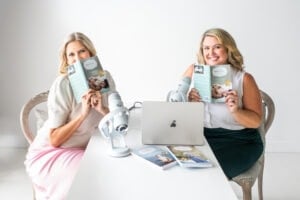My mother took risks. She was the first person in her family to earn a college degree. And when she did that, she boldly chose to move to Northern California for her first job teaching art. That’s where she met my dad, a high school English teacher. It was remarkable that, as a single woman in the 1960s, my mom charged out into the world, away from the security of her close-knit family and community. After my parents married, they moved to France—another adventure. By the time I was born, my parents had moved back to my mother’s hometown of San Antonio, and she went back to work. With two older sisters in elementary school, my Tia Lupe and I played all day, cooked, and took naps. In the late afternoons, I was back home.
My mother, Ana, was a working mother for most of my life. She was a career educator and administrator and worked in non-profit organizations. She had both a bachelor’s degree and a master’s degree in art. And she was a talented painter and photographer. My mom spoke Spanish fluently and was also an experienced traveler who loved museums and historic sites. She loved getting lost in memoirs and was addicted to politics. My mother was smart, funny, and cultured and had a strong work ethic. She was the definition of a working mother, and I am profoundly grateful that she was.
Why I Am Grateful My Mom Was a Working Mom
Life for women in the 1970s was complicated, and my mother was working and had three school-age kids. Her trajectory was not the norm. In 1972, only 42% of women between 25 and 34 were in the workforce. For the first time, in 1974, women could acquire credit cards without a male co-signer.1 And it wasn’t until 1978 that the Pregnancy Discrimination Act passed, which guaranteed that women could not be fired for being pregnant.3
By 1980, the number of women working outside the home swelled to 62%. In 2019, two-thirds of married mothers were employed, while 73.2 percent of unmarried mothers were employed.2
Now, as a working mom, I deeply understand the gifts of having a career-minded mother with fully realized interests and a lifelong passion for learning. Career-minded women of my mother’s generation did not have it easy. My generation owes hers an enormous debt.
Kids Need Role Models
Because my mom was a working mom, she could make the best choices for her. This influenced me in ways that I’m still trying to understand to this day. Hearing her talk about her big moves and bold choices permitted me to dream big. I applied for college in Boston. While my dad wasn’t 100% on board with the idea, my mother championed my choice and encouraged me to go. So, I did.
How my mother lived her life greatly influenced my ability to make choices —where to live, what educational goals I wanted to achieve, and dedicating myself to writing. I saw her passions play out in her love of art and history. Two subjects she adored and which she taught at many grade levels throughout her career. She talked to me often about what I wanted for my own life. This included whether or not I wanted to get married and have children of my own. In her eyes, getting an education and finding my own way in the world was more important than following a path others might map out for me. The only thing she ever wanted was for me to be happy. And figuring out what that would take would be a personal journey that would be mine alone.
Teaching Life Lessons
My mother would write to me religiously and tell me about her work, her students, and her projects. When she would visit me in New England, she helped me think about my plans and encouraged me to develop a dream, work toward it, and make it happen. Having a mother who was so confident showed me how my life could be. She planted important notions in my mind about self-reliance and focus. Seeing independence in action is powerful. It promotes the resiliency to bounce back from disappointment and hardship and conjures a creative instinct to live life on your own terms.
Just by being herself, she showed me what women could do. She taught me that having an abundant inner life will supersede any compulsion to compare yourself to the journeys of other women. It’s more important to be comfortable in your skin than to try to meet society’s standards of who you should be.
A Villiage I Could Count On
Having a working mom means you’re thrust into a wider community of people. Extended family, teachers, friends, and mentors—I had access to other individuals in my personal orbit who thought differently and with whom I developed lifelong relationships. I learned about different personalities and other ways of being that helped make me well-rounded and curious.
But the conversation around the pros and cons of growing up in a household where the mother worked always seemed confusing to me. As a kid, we watched episodes of Bewitched, I Love Lucy, All in the Family, Happy Days, and other family sitcoms with stay-at-home moms as the center of family life. I couldn’t understand what they did all day. From what I could tell, the moms on TV made lots of dinners and consistently got into some sort of mischief. They seemed more like supporting acts for the kids and husbands who were out all day doing things. In those households, everyone had matching placemats on their kitchen tables. That was weird.
I had close friends whose mothers stayed at home. Watching them, I finally understood all the hard work those moms did to keep their families going. They did the shopping, cooking, driving kids around, taking care of the house, the cars, the errands, the pets, and more. I was grateful to have such wonderful moms in my life. Especially during sleepovers and on trips, I was invited to join. Now, I realize how much that time with my friends in their homes probably provided much-needed breaks for my mom, who worked long hours.
Shared Responsibilities
In my family, we all worked to keep the house going—including my father. We took turns cooking, weeding the garden, mopping, washing dishes, vacuuming, taking out the trash, feeding the dog, and doing laundry. We were all expected to take care of our rooms. And having a father who actively co-parented showed me a model of a man who could pull his own weight in a house full of kids. He was a hospital administrator but worked hard at home, too. I remember my parents cooking together, doing house projects, and each finding time to spend with us. No one was absent.
For my mother, the time we spent together was all about shopping, going to the movies, hanging out in the kitchen, visiting the library, eating out, or just watching the news. She loved to travel, so we went on beach trips and visited family often. Looking back, I think all this time together was just as much for her well-being as mine. Our house wasn’t always pristine; her car was usually littered with school papers and cans of Tab or Diet Coke. But she told me she had more important things to do than keeping things tidy. With her packed schedule, she’d rather spend time doing things she liked. And she enjoyed being with us.
On the practical side—something I only really understood once I became a mother—because my mother worked, it was financially easier for my parents to subsidize enriching experiences like trips, extracurricular activities, and lessons outside of school. And, partly because my mother did work, I grew up with the promise of going to college. These are privileges for which I am deeply thankful.
Science Agrees: Having a Working Mom Is Beneficial to Their Kids
My mother’s last job was minority recruitment at the Girl Scouts of the USA headquarters in Manhattan. It was her dream job after working for many years as a teacher. There, she could work for the benefit of girls across the country. And living in New York allowed her to take art and photography classes and use the world’s best museums as her personal classrooms. At 49 and with three daughters out of college, this was a time in her life to pursue more lifelong goals. I was in awe of her drive, her confidence, and her ability to have an adventure in a completely new city yet again.
I’ve known all along what the research now says about the benefits of having a working mother. According to reporting from Working Knowledge, a publication of Harvard Business School, “In 2015, preliminary results of a groundbreaking study found that the daughters of employed mothers often perform better in their eventual careers than the daughters of stay-at-home moms. Now the full study has been released, and it brings even more good news for the children of working moms: They wind up just as happy in adulthood as the children of moms who stayed home.”
Though it’s been many years since her passing, I still marvel at how a working mother of three spirited girls could do everything she did. I wondered if my mother ever felt guilty about being a working mom. I hope she never did because we loved her for who she was. Her work experience amplified and sharpened her abilities to be a good mom. She could make quick decisions, multitask, organize, stay on task, and be creative. She applied those skills to her life as a mother every day. With her as the primary influence in my life, I knew I could be self-sufficient. I could be a dreamer. I could be a complex human being while still being a loving and present mother to my son.
Her Influences Remain Today
Today, my home is filled with my mother’s paintings and photographs. I see a content woman lounging by the seaside, a fish market in Chinatown, a wild bouquet of sunflowers, women selling fruit in a small Mexican village, and the twin towers of the World Trade Center. I still have her collection of historical non-fiction and autobiographies. And I still follow political news—however dreary—just like my mother did back in the days of Watergate.
I want my son to see who I am as a mother and a whole person. I want him to see me as a woman who achieves her goals, develops her talents, has deep interests, and works on missions that are important to her. Also, I want him to learn that he can solve problems independently and forge meaningful relationships that will support him and make him happy throughout his life. I want him to see me as the human I am—flaws and all. I want to be a good mother and a good human being. A mother who doesn’t try to do it all but who does her best. Just like my mom.





























